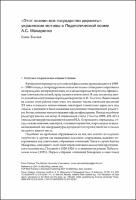Chapter «Этот хозяин все государство держить»: украинские мотивы в Педагогической поэме А.С. Макаренко
| dc.contributor.author | Tolstaya, Elena | |
| dc.date.accessioned | 2024-04-02T15:50:32Z | |
| dc.date.available | 2024-04-02T15:50:32Z | |
| dc.date.issued | 2023 | |
| dc.identifier | ONIX_20240402_9791221502381_207 | |
| dc.identifier.issn | 2612-7679 | |
| dc.identifier.uri | https://library.oapen.org/handle/20.500.12657/89238 | |
| dc.language | Russian | |
| dc.relation.ispartofseries | Biblioteca di Studi Slavistici | |
| dc.subject.classification | thema EDItEUR::C Language and Linguistics::CF Linguistics | |
| dc.subject.classification | thema EDItEUR::D Biography, Literature and Literary studies::DS Literature: history and criticism | |
| dc.subject.other | Makarenko | |
| dc.subject.other | Socialist realism | |
| dc.subject.other | Ukraine | |
| dc.subject.other | bilingualism | |
| dc.subject.other | peasantry. | |
| dc.title | Chapter «Этот хозяин все государство держить»: украинские мотивы в Педагогической поэме А.С. Макаренко | |
| dc.type | chapter | |
| oapen.abstract.otherlanguage | Ukrainian motifs in A. S. Makarenko’s Pedagogical Poem. Makarenko’s Pedagogical Poem in the Stalin era was perceived as a eulogy to the collective, while in late Soviet times the dominance of the collective and the tendency to violent solutions already irritated the Russian reader. The German historian Goetz Hillig saw Makarenko as a world pedagogical genius, created his scientific biography, and published a scholarly edition of his writings in German. Elena Tolstaya looks at The Poem, set in post-revolutionary Ukraine, in the aspect of Russian-Ukrainian bilingualism, and looks for possible responses to the actualities of the late 20s – early 30s. | |
| oapen.identifier.doi | 10.36253/979-12-215-0238-1.17 | |
| oapen.relation.isPublishedBy | bf65d21a-78e5-4ba2-983a-dbfa90962870 | |
| oapen.relation.isbn | 9791221502381 | |
| oapen.series.number | 55 | |
| oapen.pages | 17 | |
| oapen.place.publication | Florence |

